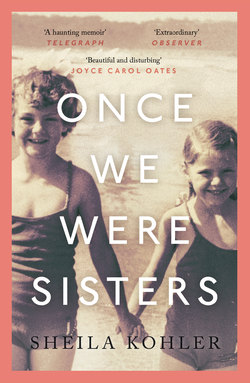Читать книгу Once We Were Sisters - Sheila Kohler - Страница 15
На сайте Литреса книга снята с продажи.
ОглавлениеVI
TALK
WHILE WE TALK, THE JANUARY SNOW STILL FALLS SOFTLY outside the sliding glass door, which opens onto a narrow terrace in New Haven. We remain together, my sister and I, in the low-ceilinged living room of the new apartment in University Towers that my husband and I have rented. My sister and I are not used to the cold, have no idea how to dress for weather of this kind, and imagine the baby would freeze outside, so we stay inside in the overheated rooms.
Michael and I have filled them with an odd mix of faux-Spanish antiques and Scandinavian furniture, which we have bought on weekends in New York at Bloomingdale’s.
An only child with divorced parents, he is eager to make a home. His father, Michael tells me, carried a card to attest to his membership in the Russian aristocracy, but was a man of modest means. He worked at Macy’s as a buyer of fine watches, but lived like a wealthy man with an apartment on Park Avenue and a stone house, which he called his dacha, in New Canaan. Though it has long since been sold, Michael proudly shows me the photographs. He went to Europe every summer to buy watches for Macy’s and stayed in the best hotels. He “borrowed from Peter to pay Paul,” he has told his boy. He married four times, though the last one was not a real marriage, apparently.
Both his father and his Southern mother, who is the poor cousin in a wealthy family of horse owners from Lexington, Kentucky, have been preoccupied above all by keeping up appearances. She now lives with an Italian lover, a count who has no money. “Count No-Account,” she says. Both his parents have been trying above all to make ends meet, while pretending to be rich. Michael, consequently, would like to fill our first home with lovely things.
My sister sits on the sofa with its carefully chosen lily pattern and rocks my baby girl. She sings Brahms’s Lullaby for her in her sweet voice.
“Lullaby and good night, sleep, my little one, softly,” my sister sings to my sleeping child. “Close your eyes, la-la-la, you are Mother’s delight.” While my baby sleeps, my husband, Michael, attends his classes in French literature at the university, which accepts only young men. It is 1962.
I have tried to talk to his classmates about Plato’s Symposium, a book I am reading. It is about a drinking party where each of the men speaks in praise of love, but Michael’s friends look at me askance: A pregnant woman without a university degree, talking about Plato? What could she know? It is apparently something they cannot grasp. They turn the conversation back to cooking, babies.
Maxine sits by the big window and holds my new baby and talks about Carl. She tells me she has had a call from one of his old girlfriends.
“Who was she?” I ask.
“A tall, attractive girl with the name of a bright flower,” Maxine says pensively. “Strelizia, she said her name was.”
The girl telephoned and asked if she might come and talk to my sister. She wanted to tell her something very important.
“What did she say?” I ask.
“It’s so strange. She begged me not to marry him,” my sister tells me, looking at me.
“Why not?” I ask.
“She would not tell me why. She just kept saying, ‘You must not marry him. Do you understand? I can’t tell you why not, but believe me, please believe me, you must not marry him.’”
“What a strange thing to say,” I say uneasily.
“I presume she must just be jealous or something. Perhaps she wants to marry him herself,” my sister says, stroking her long, doll-like dark lashes between finger and thumb.
“Do you think so?” I ask.
It is only later that the significance of this comes back to me, and I wish with all my heart that the woman had had the courage to explain what she really meant. What dark secrets had she already discovered? Why did she not dare to tell my sister what she knew? What did she fear?
So many things not said, not known.
